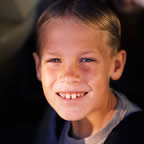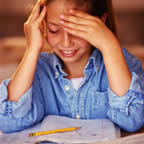3. Be Informed
Maintain a Healthy State of Mind
Middle School Students

When people watch news reports about natural disasters or terrorist attacks or school shootings, they may feel confused and scared. Maybe they worry about themselves and the safety of their family and friends. Disasters disrupt our way of life and peace of mind. They can make people feel unsafe and afraid.
The following information can help people prepare for a disaster. The more someone learns now, the easier it can be for them to deal later on with a disaster.
How do people feel after a disaster?
Lots of people are able to work through painful feelings. Most of the time they recover in weeks or months. Uncomfortable feelings and reactions
tend to fade and disappear. Some of the more common reactions are:

- Shock, numbness, and disbelief.
- Having a hard time thinking clearly or
focusing on school, friends, and family. - Eating too much or too little.
- Having trouble falling asleep or staying asleep and having bad dreams or nightmares.
- Feeling sad, mad, or afraid.
- Crying more easily or wanting to cry.
- Feeling grouchy, uneasy, worried, or moody.
- Feeling bad that they are okay while others are not.
- Feeling helpless.
- Wanting to be alone a lot, or not wanting to be alone at all.
These are common reactions. They may go away for a while and then return when something reminds you of the disaster. Some people also may have stomachaches, headaches, skin rashes, more allergic reactions, more colds, or a run-down feeling.
What can people do?
It makes sense to do what you can before a disaster happens. You can:
- Talk to your parents. Help them put together a disaster supplies kit.
- Make a plan with your family or the people you live with. Decide how to stay in touch with them if there is a disaster. Set up a meeting place.
- Learn about existing preparedness plans in your school and in your town. Share what you learn with your family.
- Learn more about how people react to stress and different ways to manage it.
If something bad happens, how do people deal with?
It helps most people to talk about what happened and how it makes them feel. When you feel like talking, it's a good idea to find friends, family, or other people you trust who have lived through the same kinds of things, and talk to them. It's also a good idea to take care of yourself physically. Eating right, exercising, getting plenty of rest. and returning to your routine should help you feel better. It also helps if you can find meaning in what happened or how you handled things.
How does someone know they need extra help to feel better?
Sometimes, even after you try most of these things, you still might not be able to get back to your regular routines. You might need help from a counselor if, after several weeks or so, you:
- Suffer so much or for so long that you don't think you can stand it.
- Can't think clearly or do your school work.
- Have a hard time helping your family.
- Are more likely to cause yourself injury or disease by:
- Drinking or smoking.
- Using street drugs.
- Using too much medicine.
- Being careless on skateboards, rollerblades, bikes, etc.
- Threatening, hurting, or fighting people.
- Have eating or sleeping problems.
- Feel like hurting yourself or others.
How would someone get outside help?
It takes strength to ask for help. Asking for help may sometimes feel uncomfortable, but seeking the assistance you need can help you deal with things better. Start by talking to one of the following:
- A parent or someone else who takes care of you.
- Your family doctor.
- A pastoral care counselor.
- A school counselor or mental health professional.
- Someone at your community health center or the local mental health clinic.
Online resources
 Check out these links for more information about how to deal with disasters:
Check out these links for more information about how to deal with disasters:
- American Red Cross
- Federal Emergency Management Agency
- National Child Traumatic Stress Network
- National Mental Health Association
- Substance Abuse and Mental Health Services Administration
- U.S. Department of Homeland Security
This information is provided by the American Red Cross and the Centers for Disease Control and Prevention (CDC).
- Page last updated May 18, 2011
- Content source: CDC Emergency Risk Communication Branch (ERCB), Division of Emergency Operations (DEO), Office of Public Health Preparedness and Response (OPHPR)
Get email updates
To receive email updates about this page, enter your email address:
Contact Us:
- Centers for Disease Control and Prevention
1600 Clifton Rd
Atlanta, GA 30333 - 800-CDC-INFO
(800-232-4636)
TTY: (888) 232-6348 - Contact CDC-INFO


